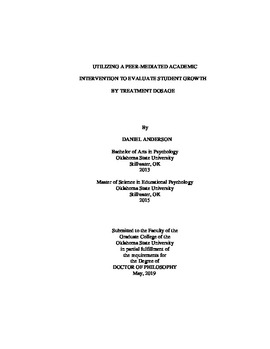| dc.contributor.advisor | Duhon, Gary J. | |
| dc.contributor.author | Anderson, Daniel Blake | |
| dc.date.accessioned | 2019-10-25T19:02:55Z | |
| dc.date.available | 2019-10-25T19:02:55Z | |
| dc.date.issued | 2019-05-01 | |
| dc.identifier.uri | https://hdl.handle.net/11244/321525 | |
| dc.description.abstract | Intervening on academic skills early in a child's academic career can remediate reading difficulties quickly and set the stage for early literacy skills (Velluntino, Scanlon, Small, & Fanuele, 2006). There are several evidence-based interventions suggested for use when a child presents with academic skill deficits (Shapiro, 2011); however, what is unknown in reading intervention research is exactly how much is needed to prevent or remediate skill deficits. Research has yet to inform practitioners of how much intervention a child will likely need to remediate the presenting difficulties. In essence, research has yet to suggest what dose of intervention to give a struggling student when presenting with reading skill deficits. This study sought to understand how the dosage (i.e., frequency of administration) of reading intervention effects learning. Specifically, in a group administered repeated readings intervention, what is the difference in intervention effectiveness when students are given different dosages of intervention between every day and every other day? Further, is there a more efficient dosage between reading intervention given every other day and every day? The current study examined these questions in an elementary school in the Southern Plains of the U.S. Students from grades 2-5 participated with a total of 34 students who received reading intervention daily or every other day, based on random assignment to groups. Oral reading fluency was measured weekly for progress monitoring and words correct per minute were calculated across a total of 6 weeks. A repeated measures ANOVA found significant growth for both groups across time, suggesting a group administered, peer-mediated repeated readings intervention is effective in increasing words correct per minute for all students who received intervention. However, there were no differences detected between groups. Post-hoc analyses were conducted to inform future research examining the dosage of intervention. Overall, the current study found significant results for a main effect of a peer-mediated repeated readings intervention, therefore suggesting a peer-mediated group administered repeated readings intervention is an effective tool for increasing a student's oral reading fluency performance. Limitations are discussed, and implications for practice and future research are examined. | |
| dc.format | application/pdf | |
| dc.language | en_US | |
| dc.rights | Copyright is held by the author who has granted the Oklahoma State University Library the non-exclusive right to share this material in its institutional repository. Contact Digital Library Services at lib-dls@okstate.edu or 405-744-9161 for the permission policy on the use, reproduction or distribution of this material. | |
| dc.title | Utilizing a Peer-Mediated Academic Intervention to Evaluate Student Growth by Treatment Dosage | |
| dc.contributor.committeeMember | Poncy, Brian C. | |
| dc.contributor.committeeMember | Anthony, Christopher J. | |
| dc.contributor.committeeMember | Cantley, Penny | |
| osu.filename | Anderson_okstate_0664D_16096.pdf | |
| osu.accesstype | Open Access | |
| dc.type.genre | Dissertation | |
| dc.type.material | Text | |
| dc.subject.keywords | intervention dosage | |
| dc.subject.keywords | peer-mediated repeated readings | |
| dc.subject.keywords | repeated readings | |
| thesis.degree.discipline | School Psychology | |
| thesis.degree.grantor | Oklahoma State University | |
